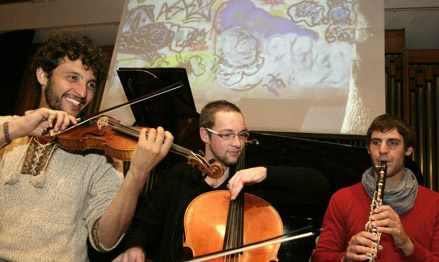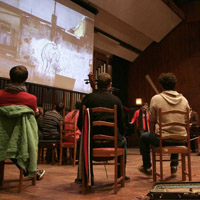Latest News Archive
Please select Category, Year, and then Month to display items
12 January 2024
|
Story Nonsindiswe Qwabe
|
Photo Sonia Small
 Since joining the UFS in 2008, Dr Grey Magaiza has worked extensively on approaches that can foster the socio-economic transformation of societies.
Since joining the UFS in 2008, Dr Grey Magaiza has worked extensively on approaches that can foster the socio-economic transformation of societies.
“The future should be one where communities can decide on their development agenda and futures. That’s the most important for me.” Dr Grey Magaiza, Deputy Director of the Centre for Gender and Africa Studies (CGAS) and Head of the Community Development programme on the Qwaqwa Campus, is passionate about capacitating communities to be agents of change and advancement. His vision for the future emphasises the empowerment of communities to take charge of their development by actively participating in decision making and the implementation of development projects that can improve their lives.
Since joining the UFS in 2008, Dr Magaiza has worked extensively on approaches that can foster the socio-economic transformation of societies. Over the years, he has crafted his research speciality into one that he is most proud of – being an interdisciplinary scientist immersed in the development of communities.
“I’m in a fortunate position of researching what I like. I say ‘fortunate’, because I’ve taken the time to understand what I’m passionate about, which is the overall field of rural livelihoods and livelihood futures – in short, community development. My research starts from an engaged university, understanding the elements that a university must use to enhance transformation and relevance to its immediate community in terms of development.”
One of the ways he has done this is by looking at social entrepreneurship as a development approach for young people in a rural setting. Through workshops with non-profit and civic organisations in Qwaqwa, Dr Magaiza has been helping these organisations to map out their needs and actively meet them through the involvement and support of external role players.
“We understand that communities are part of the national development agenda, but even that national agenda respects community knowledge and intentions and allows communities to shape their identity. A critical enabler of this is community organising. You bring back the capacity in communities to have dialogues on issues affecting them as spaces for engagement, knowledge exchange, and for people to just talk about their way forward.”
By enabling communities to define their development agenda, they can address their specific needs, challenges, and aspirations, he said. “When I look at livelihood futures, it’s quite an exciting aspect of my work – it’s like looking into a fortune tellers’ globe, because you’re not deciding for communities what they should do, but the communities themselves take those decisions.”
‘Celebrating the music of our times’
2013-07-25
|
 |
| 25 July 2013 |
The Odeion School of Music’s (OSM) New Music Week, hosted from 17–20 July 2013, offered an experience of profundity.
This was the second week-long festival of its kind to be hosted by the OSM – last year the 90th birthday of the South African composer, Stefans Grové, was celebrated with concerts and a symposium. This year the New Music Week focused on the visit of Ensemble Trans-Z under the artistic leadership of former OSM student, Alfred Vorster, a composer living in Zürich. The Order of the Odeion School of Music was bestowed upon Vorster during the festival. The members of the ensemble are the Belgian pianist Lukas Huisman, Danré Strydom (currently an OSM doctoral student in clarinet, based in Ghent), the Argentinian violinist Juan Braceras and the Swedish cellist Karolina Öhman (both currently living in Basel, Switzerland).
The week included three lectures. Lukas Huisman elucidated his doctoral project, Alfred Vorster offered an analytical perspective on the work of Helmut Lachenmann and Hannes Taljaard (Potchefstroom) delivered a commentary on his own composition practice. In addition to presenting masters’ classes in their individual instruments, Ensemble Trans-Z also hosted two workshops – one for the Mangaung String Project and another for OSM students and staff. These workshops focused on creative improvisation practices within an avant-garde style.
composition practice. In addition to presenting masters’ classes in their individual instruments, Ensemble Trans-Z also hosted two workshops – one for the Mangaung String Project and another for OSM students and staff. These workshops focused on creative improvisation practices within an avant-garde style.
The highlight of the festival was two gala concerts that were held on 19 and 20 July. The first concert was hosted by Ensemble Trans-Z themselves, with a selection of compositions in the avant-garde style. The programme included challenging listening material and was creatively presented with unconventional lighting techniques and visual material.
The concert on 20 July consisted of New Music of a more conventional nature. The Odeion String Quartet offered a varied presentation which consisted of a rich mix of talent. OSM postgraduate students Marianne Cilliers, Karol Legierski and Eljee du Plooy formed part of this spectacular performance. The OSM flute lecturer, Handri Loots and the members of Ensemble Trans-Z supplied additional depth to the concert. The experience was made extra special by the recently-formed New Music Ensemble of the School of Music at the North-West University – led by Augusto Arias. Under conductorship of Jan-Moritz Onken, the OSM Camerata completed this impressive collaboration.
The Camerata’s recital of Hendrik Hofmeyr’s Phantom Waltz, which the composer newly arranged especially for this ensemble, was but one of the artistic highlights of an inspiring presentation.